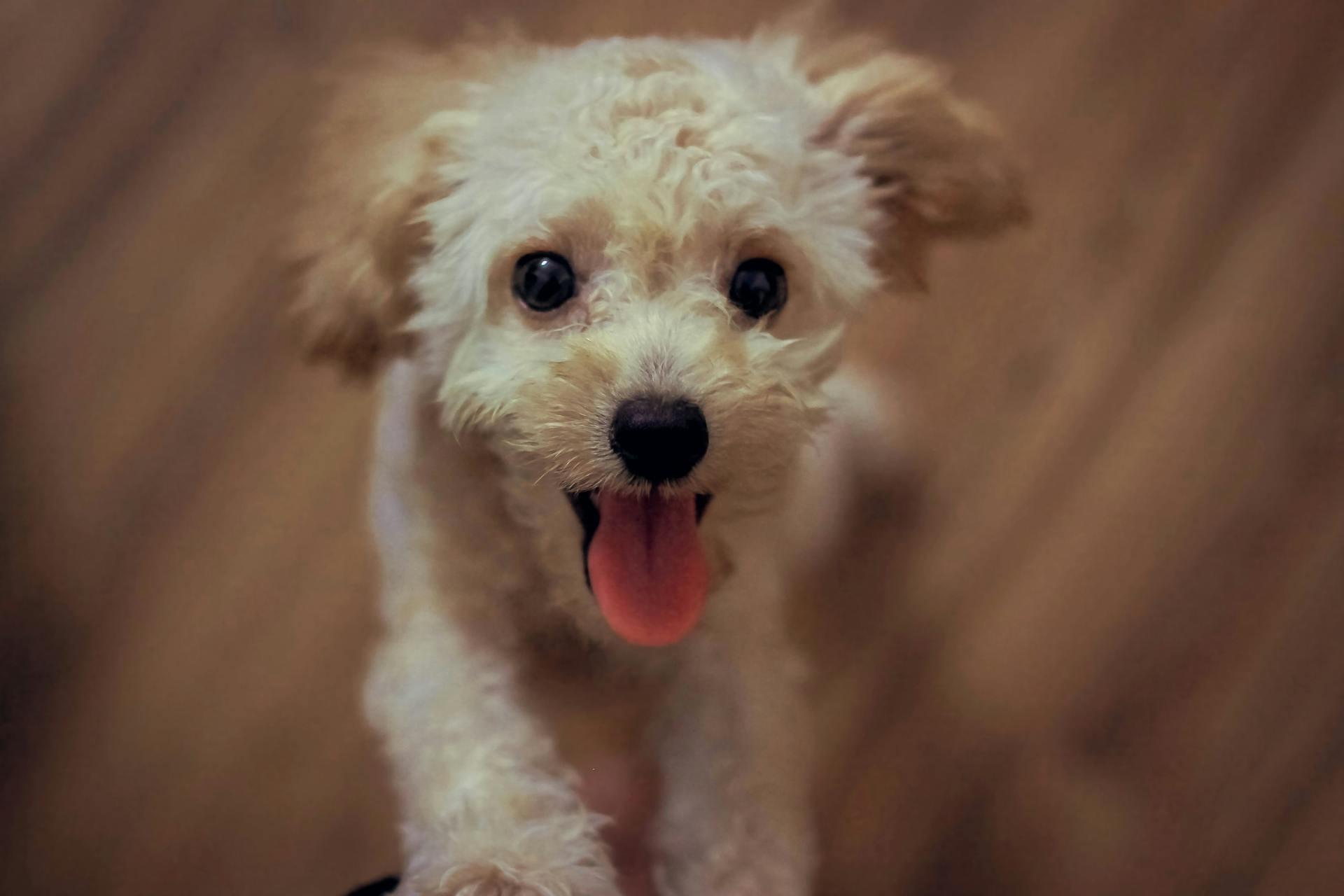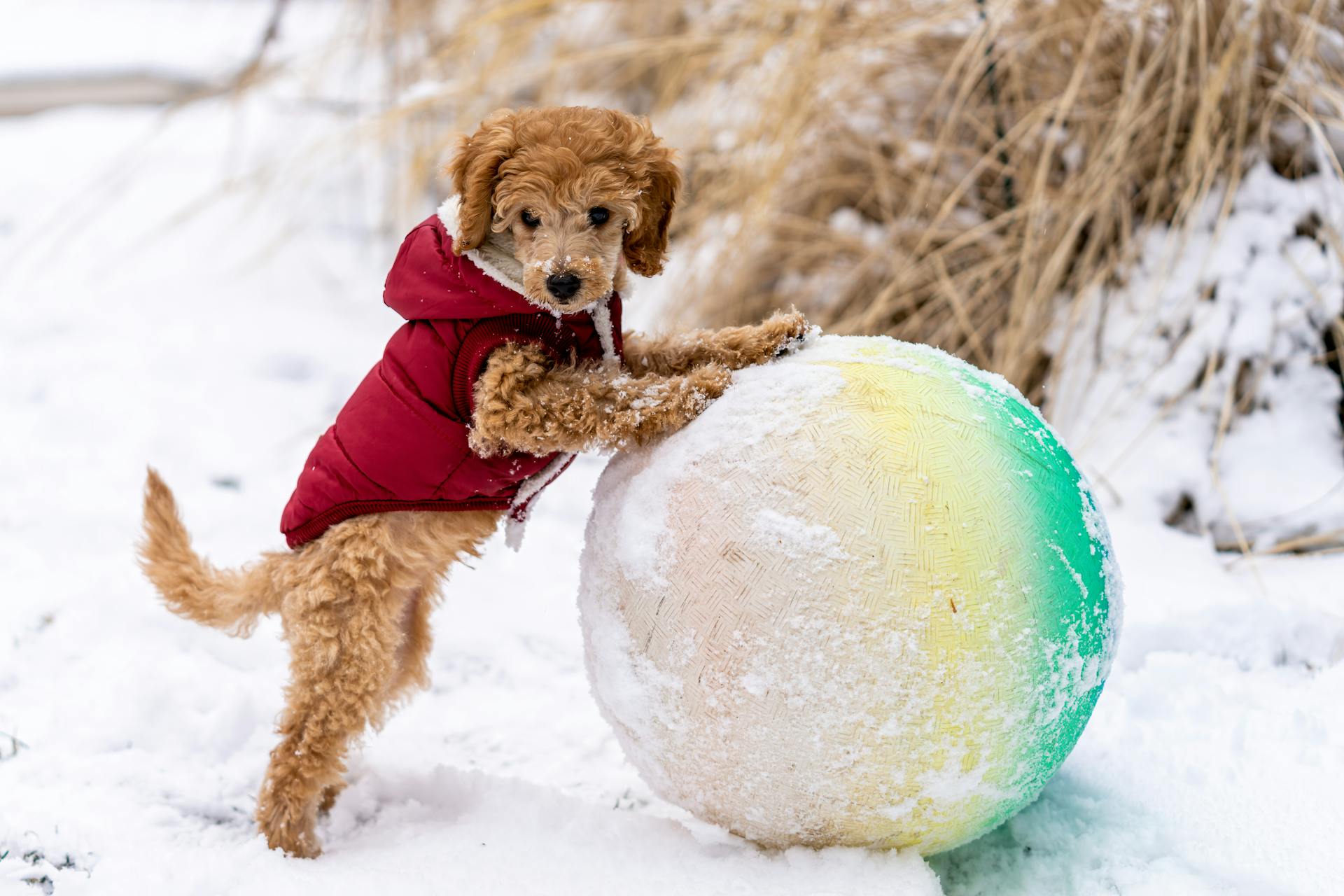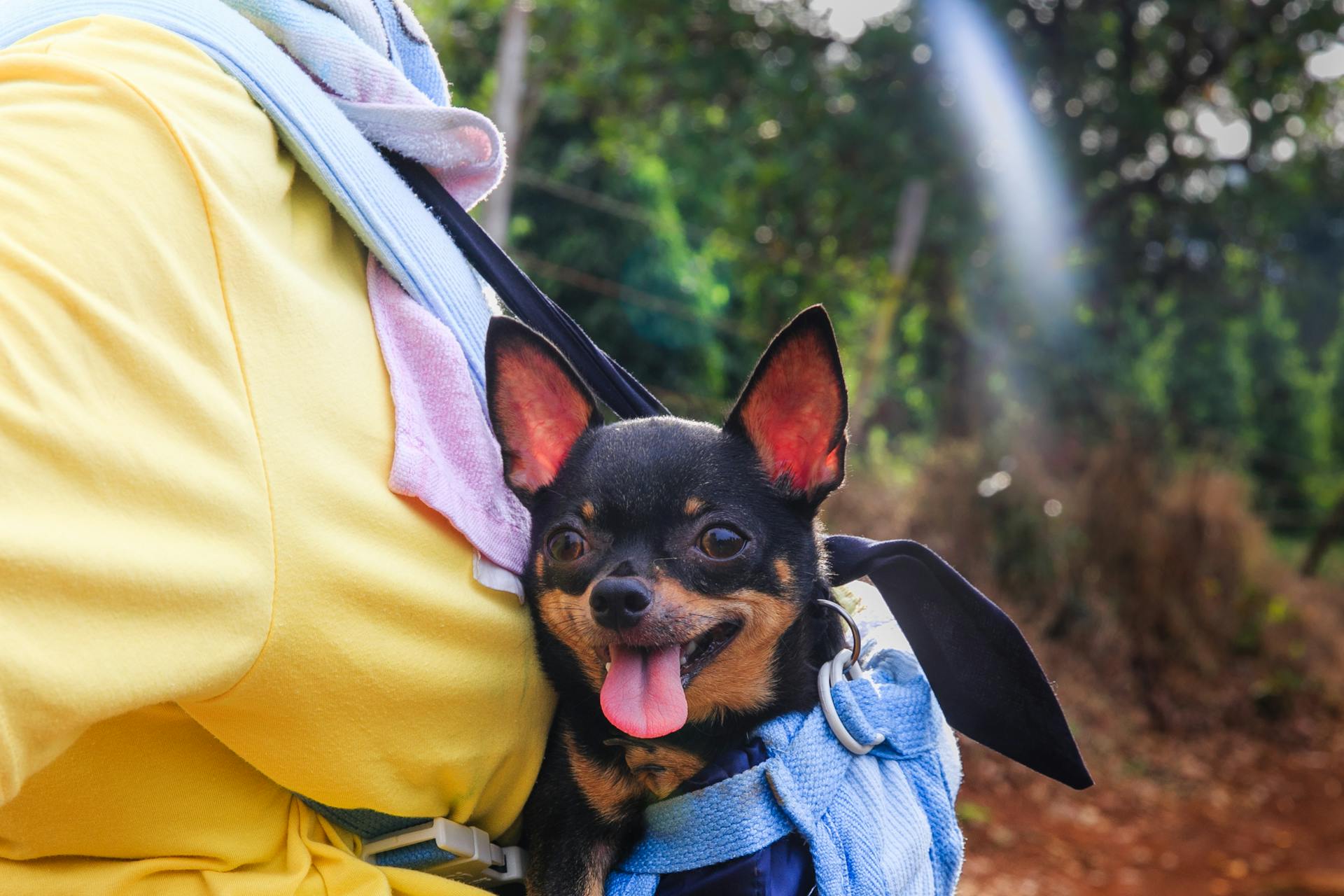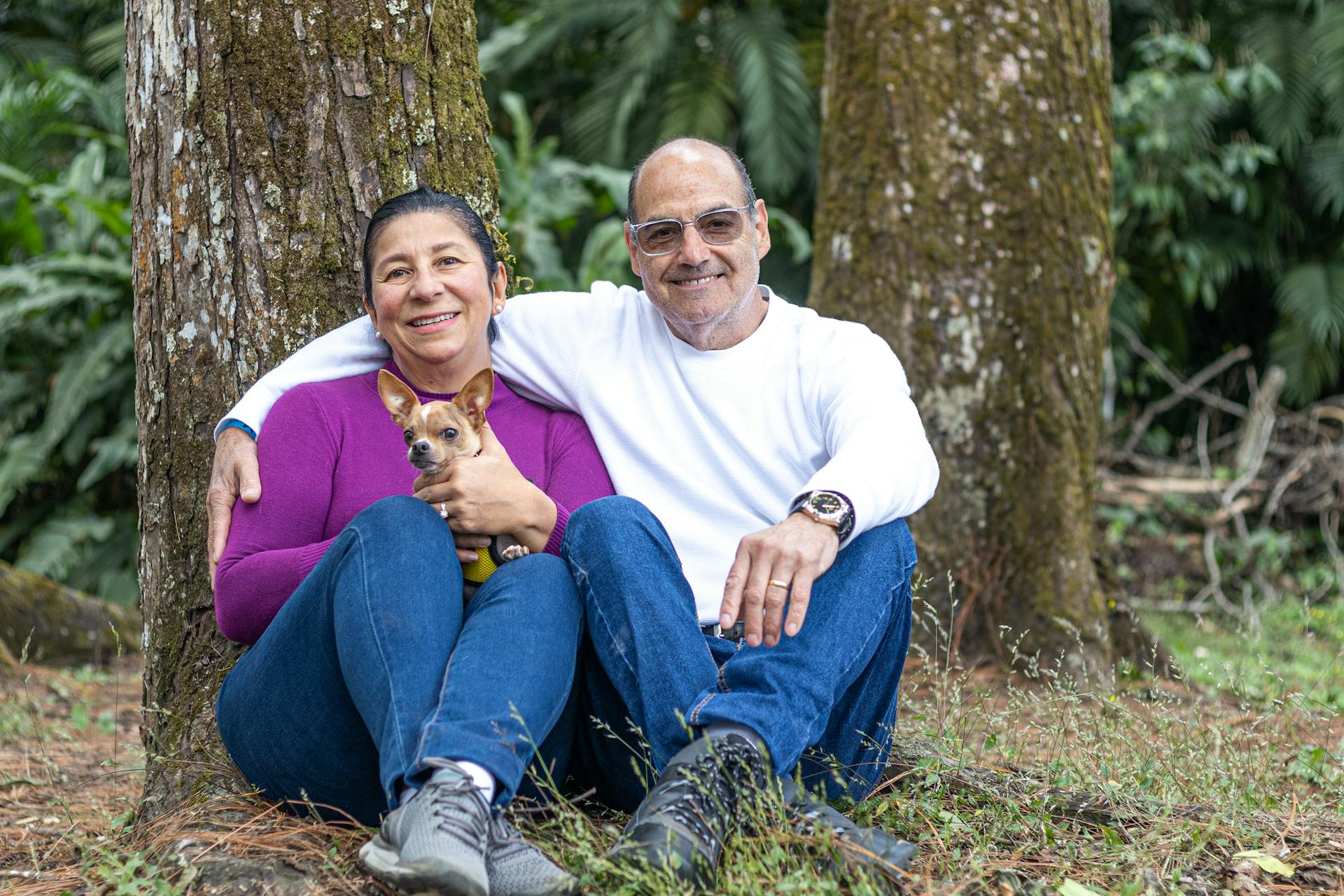
The Toy Poodle and Chihuahua Mix is a unique and adorable breed that combines the intelligence and trainability of the Toy Poodle with the feistiness and loyalty of the Chihuahua.
This mix is often referred to as a "Pochi" or "Chipoo", and it's considered a hybrid breed, meaning it doesn't have a specific breed standard.
The Toy Poodle and Chihuahua Mix typically weighs between 8-18 pounds and stands about 6-10 inches tall at the shoulder.
Their coats can vary greatly in texture and length, ranging from smooth to curly, and they often require regular grooming to prevent matting and tangling.
What is a Toy Poodle and Chihuahua Mix?
A Toy Poodle and Chihuahua mix is obtained by mixing a Miniature or Toy Poodle with a Chihuahua.
These cute small dogs have soft wavy hair that's characteristic of their Poodle parentage.
They are often referred to as Chipoo or Chi-Poo, which is derived from the names of their parent breeds.
Breed Overview
The Chi-Poo is a tiny dog that typically weighs between 8-18 pounds.
They come in a variety of colors including chocolate, gray, black, fawn, white, brindle, and brown.
These little dogs are suitable for smaller families who want an active pet.
Despite their small size, they require regular exercise to stay happy and healthy.
Chi-Poos are known for being devoted, energetic, and intelligent dogs.
Their temperament can make them more difficult to care for than other breeds.
Chihpoo Temperament Personality
Chihpoos are known for being extremely devoted to their owners and can become one-person dogs.
They're highly intelligent and can learn commands easily, but they require consistent mental stimulation to prevent boredom.
With proper socialization from an early age, Chihpoos can be accepting of strangers, although they may still bark excessively at new people.
These tiny creatures are quite active, especially when young, and need regular exercise and playtime to keep them happy and healthy.
Chihpoos have big personalities despite their small size, and they're known for being outgoing, lively, and confident.
They can be a bit too protective of their owners, which is why socialization is so important from an early age.
While Chihpoos are great companions, they may not be the best option for families due to their strong attachment to one person.
Care and Ownership
To care for a toy poodle and Chihuahua mix, regular vet visits are essential, ideally every year.
These check-ups will help you catch potential conditions early on, preventing them from worsening over time.
Their eyes and ears require special attention, so be sure to regularly inspect them for debris, such as crustiness around the eyes due to overactive tear glands.
Chi-Poo Care and Ownership
You'll want to take your Chi-Poo to the vet every year for a check-up and build a relationship with a trusted veterinarian.
Annual vet visits will help catch conditions before they become serious issues, so don't skip this important step.
Chihuahua poodle mixes have overactive tear glands that can lead to wet fur and crustiness around their eyes - just wipe it clean with a wet paper towel or get prescription medication from your vet if needed.
Regular nail clipping is also essential for Chi-Poo grooming, as they don't require much else in terms of maintenance.
Brushing their teeth regularly will keep them healthy and happy too.
Do?
Do Chihuahua Poodle Mixes Bark?
Chihuahua poodle mixes bark often, but usually only for a reason. They will bark to alert you to strangers.
Some days they will bark more than others.
They may also bark if they feel discomfort.
It's essential to understand that every dog is different, and their barking habits can vary greatly depending on their individual personalities.
Chihuahua poodle mixes are known for being loyal companions and will often bark to get attention from their owners.
A unique perspective: Do Toy Poodles Bark a Lot
Chi-Poo Costs
The cost of owning a Chi-Poo can be quite high, with prices ranging from $1000 to $2500 for a puppy.
You'll also need to consider adoption costs, which are often lower - around $500 at shelters that may cover initial vaccinations and spaying/neutering as well.
In addition to the upfront costs, you should factor in lifetime expenses like food, treats, medical care, travel/boarding, emergency bills, grooming, supplies, and dog training.
On average, small dog owners spend between $15,000 to $25,000 over 10-12 years.
Health and Nutrition
Chihuahua poodle mixes are generally healthier than their purebred parents thanks to hybrid vigor.
Their mixed breed heritage means they have a more varied genetic pool, reducing the risk of inheriting certain conditions common in their parent breeds.
Some health issues you want to look out for include hyperactive tear glands, hypoglycemia, luxating patellas, and digestive problems.
Regular veterinary check-ups can help catch these health conditions early, improving your dog's prognosis.
A balanced diet is crucial to maintain a healthy weight and prevent digestive problems. Look for food formulated for small breeds and avoid overfeeding adults with more than one cup of kibble per day.
You might like: What Do Toy Poodles Look like
Here are some dietary tips:
- Feed puppies four small meals instead of two larger ones.
- Consider feeding three or four tiny meals a day to prevent digestive problems.
- L ook for foods containing healthy fats, protein, and carbohydrates on the nutrition label.
With proper care and attention, Chihuahua poodle mixes can live up to 12-15 years.
Dog Nutrition
Chihuahua Poodle mixes are prone to digestive problems, so it's essential to feed them a high-quality food that's formulated for small dog breeds.
Look for foods with healthy fats, protein, and carbohydrates on the nutrition label to help maintain their energy levels and promote growth.
Avoid feeding adults more than one cup of kibble per day, and consider dividing meals into 3-4 smaller portions to prevent digestive health problems.
Puppies require even more frequent feedings, with four small meals a day until they're about six months old.
To keep your Chi-Poo at the correct weight, monitor their food intake and ensure they get enough exercise. Obesity can lead to serious health problems later on.
A good rule of thumb is to feed ¾ to ½ cup of food per day, depending on activity levels and weight.
Here are some common health issues that can affect Chihuahua Poodle mixes:
- Idiopathic epilepsy
- Luxating patella
- Legg-Calve Perthes disease
- Hypoglycemia
- Tracheal collapse
To minimize the risk of these health issues, choose a reputable breeder who conducts health checks on their parent dogs.
Consider reading: Health Issues with Toy Poodles
Health Problems

Chihuahua poodle mixes are generally healthier than their purebred parents due to hybrid vigor.
They can still experience health problems like hyperactive tear glands, which require regular cleaning around their eyes.
Regular veterinary check-ups can help catch health conditions early and improve your dog's prognosis.
Some common health issues in Chihuahua poodles include hypoglycemia, luxating patellas, digestive problems, and glaucoma.
The lifespan of a Chihuahua poodle mix is typically 12-15 years with proper care.
Here are some specific health concerns to watch out for:
- Hyperactive tear glands
- Hypoglycemia
- Luxating patellas (knees slipping out of place)
- Digestive problems
- Glaucoma (pressure build-up behind the eyes)
Taking your dog to the vet at the earliest signs of health problems is crucial, especially since symptoms can be similar between conditions.
Chihpoo Physical Characteristics
The Chihpoo is a low-shedding dog breed.
Their coat can vary widely, and some may require professional grooming every few months to prevent matting and tangling.
Brushing once a week with a pin brush is usually enough to keep their coat healthy and looking its best.
However, if you let your Chihpoo's hair grow longer, they'll need daily brushing to prevent mats and tangles.
Some Chihuahua Poodle mixes may not shed at all, while others may shed like a regular Chihuahua.
You never know what you'll get when you mix two breeds, so adapting their grooming routine to their needs is crucial.
Their teeth need to be cleaned regularly to prevent periodontal disease, which affects 80% of dogs over the age of three.
Preventative brushing is essential to prevent costly surgeries later on.
Nail trimming is also important for your Chihpoo's health and wellness.
You'll want to brush their coat at least three times a week to prevent matting, ingrown hairs, and debris buildup.
A bath once a month can help keep their coat clean, especially if it gets dirty.
Brushing their teeth twice a week will reduce the risk of gum disease and tooth decay.
Daily brushing is essential for Chihuahua Poodle mixes with curly hair to get rid of knots and tangles.
A unique perspective: Hypoallergenic Dogs Poodle Mixes
Size and Generation
The size of a Chihuahua-Poodle mix can vary greatly depending on its parents. Typically, a Chipoo puppy can weigh between 3 and 20 pounds with an average height of 5 to 15 inches.
If the Toy Poodle is used in the mix, we can expect the Chihpoo puppies to weigh around 3 to 12 pounds. On the other hand, offspring of Miniature Poodles are likely going to weigh around 10 to 20 pounds.
Here's a breakdown of possible Chipoo generations and their characteristics:
This information can help us estimate the puppies' coat types, size, shedding levels, and other traits.
Defining 'Size
The Chihuahua Poodle mix, also known as a Chipoo, is a tiny dog that can weigh between 3 and 20 pounds.
A Chipoo's size depends on its parents, particularly the size of the Poodle used in the mix. Toy Poodles typically result in smaller Chipoos, while Miniature Poodles produce slightly larger offspring.

Male Chipoos are generally bigger than females in height and weight, but there's still a wide range to consider when it comes to individual sizes.
Chipoo puppies can weigh anywhere from 3 to 12 pounds if their Toy Poodle parent is used, or around 10 to 20 pounds if the Miniature Poodle is involved.
Chipoo Variations Generations
The Chipoo Variations Generations are a key factor in understanding this adorable hybrid breed.
Chihpoos are most commonly bred as first-generation pups, but we can expect to see more variations in the future.
First-generation Chipoos, also known as F1 Chipoo, have a 50% Chihuahua and 50% Poodle genetic makeup.
The F1B Chipoo is a first-generation backcross, meaning it's bred with a Poodle parent again. This results in a 25% Chihuahua and 75% Poodle mix.
Another variation is the F2 Chipoo, which is a second-generation cross between two F1 Chipoos. This also yields a 50% Chihuahua and 50% Poodle genetic makeup.
The F2B Chipoo is a second-generation backcross, bred with an F1B parent. This results in a 37.5% Chihuahua and 62.5% Poodle mix.
Here's a breakdown of the possible Chipoo generations:
These variations in generations can affect the puppies' coat types, size, shedding levels, and other traits.
Behavior and Training
Chihuahua Poodle mixes are relatively easy to train due to their intelligent nature.
Their high intelligence means they can learn tricks and even work as service dogs with ease.
However, these dogs can be feisty and may show a stubborn side from time to time, requiring consistent training and socialization from an early age.
Two 30-minute walks per day should suffice for this breed, but mental stimulation is just as important to prevent boredom and destructive behaviors.
Interactive games, puzzle toys, and consistent training are great ways to keep your Chi-poo happy and grounded.
To curb barking habits, train your dog to only bark on cue and desensitize them to various experiences from an early age.
Here's a list of tips for effective training:
- Start socializing and training your puppy from an early age.
- Use interactive games and puzzle toys for mental stimulation.
- Train your dog to only bark on cue.
- Desensitize your dog to various experiences from an early age.
By following these tips, you can successfully raise a well-rounded adult Chi-poo.
Compatibility and Socialization
Chi-Poos can get along with other dogs if socialized properly at a young age, but may be too protective if not introduced to several dogs correctly.
Puppy classes are highly recommended for Chi-Poos as they provide training and socialization that's essential for these canines.
They have a higher prey drive and aren't the best option for homes with felines, as they're prone to chasing cats.
With proper socialization, some Chi-Poos may get along okay with cats, but others won't be able to adjust.
Good with Children?
Chihuahua poodle mixes are great with kids. They're too small to harm children.
They're durable enough to play rough with kids without getting hurt. Still, they might get aggressive if they feel threatened.
Keep an eye on your Chihuahua poodle mix when they're around your child to see if you need to intervene or implement more training.
Some breeds require extra attention and care around young children, but that's not the case with Chihuahua poodle mixes.
You might enjoy: Big Dog Poodle Mixes
Animal Interactions
Chi-Poos can get along with other dogs if socialized properly from an early age, but they may be too protective to coexist peacefully if not introduced to multiple dogs at a young age.
Puppy classes are highly recommended for Chi-Poos as they provide essential training and socialization. Due to their high prey drive, it's best to avoid keeping them in homes with felines, as chasing cats is a challenging behavior to correct through socialization alone.
Chihuahua poodle mixes are great with kids due to their small size and durability, making them suitable for playtime without worrying about harm.
However, they may get aggressive if feeling threatened, so it's crucial to keep an eye on interactions between children and Chihuahua poodle mixes.
Choosing a Suitable Dog
If you're considering getting a dog, think about your lifestyle and living situation first. You'll want to choose a breed that fits well with where you live.
Time is a crucial factor when it comes to caring for a dog. Chihuahua poodle mixes require at least an hour of playtime per day.
Don't worry if you're new to dog ownership; experience caring for a poodle or Chihuahua will give you a head start with this breed.
If you live in a small apartment, consider the noise level of your potential pet. The bark of a Chihuahua poodle mix may be too loud for some owners.
Ultimately, choose a breed that you're comfortable with and can provide the necessary care for.
Purchasing and Ownership
Before getting a toy poodle and Chihuahua mix puppy, consider that this Doodle breed requires special care due to its hybrid nature.
Research reputable breeders who prioritize health testing for genetic disorders common in both parent breeds, such as hypoglycemia in Chihuahuas and eye problems in Poodles.
You Never Know What You're Getting
As you consider bringing a Chi-Poo into your life, keep in mind that their appearance and personality can be quite unpredictable.
You never know what traits they'll inherit from their Poodle or Chihuahua parents, which means every Chi-Poo is unique.
Their physical characteristics can vary greatly, but one thing's for sure: they're always adorable.
Check this out: Yorkie Poodle and Chihuahua Mix
Puppy Buying Guide: 10 Essential Tips
If you're keen on adopting a Chihpoo puppy, be prepared for a potentially long search - there aren't many breeders who specialize in this rare breed.
You can expect to pay between $1500 and $4000 for a Chihpoo puppy from a reputable breeder in the US.
Before bringing home your new furry friend, make sure you research ethical Doodle breeders through directories like our Chipoo Breeders Directory.
If you're looking to adopt an adult Chi-Poo or a puppy that's been part of an accidental litter, be prepared for potentially low costs - sometimes even free.
However, if you do find a reputable breeder who specializes in Chihuahua Poodle mixes, they'll likely charge more due to the care and health testing they provide for their puppies.
It's worth noting that many Chi-Poo puppies end up in animal shelters, where adoption prices are often lower - typically based on the dog's individual needs.
For more insights, see: White Yorkie Poo
Chihuahua-Poodle Mix 101: Final Thoughts
The Chihuahua-Poodle mix is a lively and loving dog that can thrive equally well in small apartments and big houses.
One thing to consider when bringing a Chipoo into your life is their high energy level - they're intelligent and active dogs that require regular exercise.
Their feisty personality means they can be stubborn at times, but with patience and consistency, you can train them to be well-behaved companions.
Frequently Asked Questions
Is a Chi-Poo a good dog?
Yes, a Chi-Poo is considered a great companion for families with children and busy owners due to its low-maintenance nature. They are adaptable dogs that thrive in various living situations, making them an excellent choice for many households.
Is a Chi-Poo hypoallergenic?
Yes, a Chi-Poo is considered hypoallergenic due to its Poodle parent. Regular grooming is essential for maintaining their health and wellness.
What is the lifespan of a chipoo dog?
A Chipoo's average lifespan is 12-15 years. This breed combines a long life with a loving personality, making them a popular companion for many families.
Do Chi-Poo dogs shed?
Chi-Poo dogs may have a low-shedding coat due to their poodle genes, but shedding is still possible
What is a Chihuahua Poodle called?
A Chi-Poo is a crossbreed between a Chihuahua and a Miniature Poodle. This adorable mix typically weighs 5-15 pounds and stands 6-10 inches tall.
Sources
Featured Images: pexels.com


